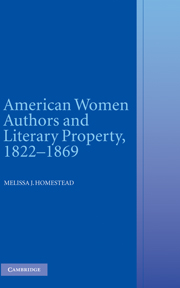Book contents
- Frontmatter
- Contents
- Preface: “Imperfect Title”
- Acknowledgments
- Introduction: “Lady-Writers” and “Copyright, Authors, and Authorship” in Nineteenth-Century America
- 1 Authors, Wives, Slaves: Coverture, Copyright, and Authorial Dispossession, 1831–1869
- 2 “Suited to the Market”: Catharine Sedgwick, Female Authorship, and the Literary Property Debates, 1822–1842
- 3 “When I Can Read My Title Clear”: Harriet Beecher Stowe and the Stowe v. Thomas Copyright Infringement Case (1853)
- 4 “Every body sees the theft”: Fanny Fern and Periodical Reprinting in the 1850s
- 5 A “Rank Rebel” Lady and Her Literary Property: Augusta Jane Evans and Copyright, the Civil War and After, 1861–1868
- Epilogue: Belford v. Scribner (1892) and the Ghost of Mary Virginia Terhune's Phemie's Temptation (1869); or, The Lessons of the “Lady-Writers” of the 1820s through the 1860s for Literary History and Twenty-First-Century Copyright Law
- Index
2 - “Suited to the Market”: Catharine Sedgwick, Female Authorship, and the Literary Property Debates, 1822–1842
Published online by Cambridge University Press: 24 July 2009
- Frontmatter
- Contents
- Preface: “Imperfect Title”
- Acknowledgments
- Introduction: “Lady-Writers” and “Copyright, Authors, and Authorship” in Nineteenth-Century America
- 1 Authors, Wives, Slaves: Coverture, Copyright, and Authorial Dispossession, 1831–1869
- 2 “Suited to the Market”: Catharine Sedgwick, Female Authorship, and the Literary Property Debates, 1822–1842
- 3 “When I Can Read My Title Clear”: Harriet Beecher Stowe and the Stowe v. Thomas Copyright Infringement Case (1853)
- 4 “Every body sees the theft”: Fanny Fern and Periodical Reprinting in the 1850s
- 5 A “Rank Rebel” Lady and Her Literary Property: Augusta Jane Evans and Copyright, the Civil War and After, 1861–1868
- Epilogue: Belford v. Scribner (1892) and the Ghost of Mary Virginia Terhune's Phemie's Temptation (1869); or, The Lessons of the “Lady-Writers” of the 1820s through the 1860s for Literary History and Twenty-First-Century Copyright Law
- Index
Summary
In 1838, Catharine Maria Sedgwick signed a petition to Congress in favor of the passage of an international copyright law. At the heart of this petition that proclaims its signers to be “Citizens of New York” is an extravagant, masculine-gendered metaphor of American-author-as-soldier:
Our policy, different and even adverse, to the principles prevalent throughout Europe, render us a shining mark for the envenomed arrows of jealousy and misrepresentation. Many have been the shafts already sped, and the quiver is by no means exhausted. It behooves us to avail ourselves of all means of just defence. That protection may be found in the fearless and able exertions of our native writers. Induced by every motive of patriotism to defend our institutions, they will hardly rest satisfied with remaining on the defensive. They will base their hopes of fame, and their claims to future remembrance, on the bold and manly promulgation of liberal sentiments. They will thus not only become the guardians of our country's fame, but the benefactors of our race.
In the terms of the petition's extended metaphor, American authors take up arms to defend America's democratic institutions from foreign attack, implying, perhaps, a repeat of the War of 1812. By signing the petition, Sedgwick figuratively joined this authorial militia, asking Congress for support in its mission of defending America from the “envenomed arrows of jealousy and misrepresentation” fired at America from other countries.
- Type
- Chapter
- Information
- American Women Authors and Literary Property, 1822–1869 , pp. 63 - 104Publisher: Cambridge University PressPrint publication year: 2005



